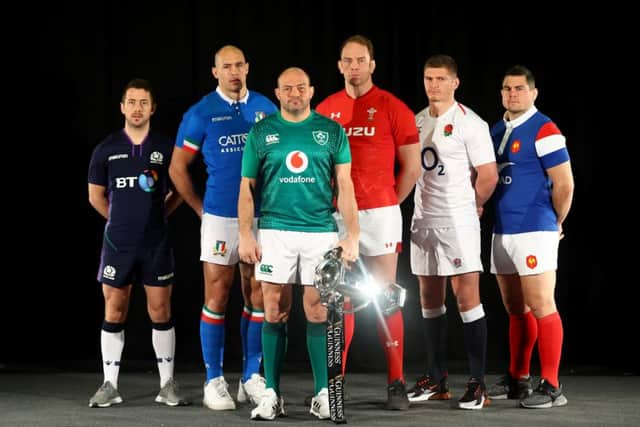Why Europeans won’t risk Six Nations for proposed ‘Nations Championship’
There were, at the last totting up, three parties after a slice of rugby’s pie:
1. CVC Partners.
The private equity group has reportedly tabled a £500 million bid for 30 per cent of the Six Nations.


2. International Management Group (IMG).
Advertisement
Hide AdAdvertisement
Hide AdThe famous sports management company has offered £1.75 billion for, well, nobody seems to know exactly what they want in return.
3. Infront Sports.
The group is fronted by Philippe Blatter, nephew of Sepp and the proposed deal guarantees a minimum of £10m per annum per participant in the 12-strong “Nations Championship” with the blessing of World Rugby.
However their Chinese parent company have been attempting to sell Infront for the last two years. The Nations Championship adds to the already heavy international burden of Test players and the international game encroaches even further upon the club game with all the brawling that entails.
But the single biggest impediment to the Infront plan is that the Europeans won’t risk the wellbeing of their Six Nations just to subsidise the southern hemisphere teams. It is not going to happen.
The exception is France, who are in favour of the Nations Championship but they appear to be in a minority of one with the RFU complaining that Twickenham might have to be hocked and the Celts wondering how they will run Pro14 teams without the Six Nations money. The phase that keeps cropping up is “guardians of the game”. The next step is an important one and whoever makes the decision knows they won’t be forgiven quickly if they get it wrong.
Even those in the north who accept that some sort of redistribution of resources should take place to prevent the mass exodus of players from Sanzaar (South Africa, New Zealand, Australia and Argentina) countries are not willing to risk the Six Nations to bring that about. Instead there is talk of 10 per cent of ticket sales going to visiting teams, especially tier two sides.
The Six Nations needs unanimity to change their socks and there is almost no appetite to reshape Europe’s showpiece tournament. Why risk it, they say, especially when Sanzaar’s own halo is looking a little tarnished? Pulling the plug on Japanese Super Rugby side Sunwolves just months before Japan hosts the World Cup is not likely to grow the global game in Asia.
Oh, and nor does the north like being lectured on the plight of second tier nations. Australia last toured their Fijian neighbours in 1984. Scotland have been twice in the last seven years.
Advertisement
Hide AdAdvertisement
Hide AdThe CVC deal is a possibility not least because, with just a 30 per cent stake in return for their largesse, they correctly point out that if they grow the business then everyone benefits. But if the Six Nations get into bed with ‘big money’ don’t be surprised if they want all the duvet. It is the nature of the beast.
The main problem here is the TV deal which looks like the low hanging fruit. The easiest way for anyone to make a quick buck is to line up Netflix, Amazon Prime, BT Sport and Sky and hand the tournament to the deepest pockets.
But whatever you receive from pay-per-view television you lose in profile and viewing numbers because you won’t get the 8.9 million that watched this year’s Wales-England game on terrestrial TV. The Six Nations is part of the sporting calendar, like Wimbledon or the Grand National, and you hope that someone asks for revised bids with terrestrial television guarantees written into the contract.
One potential solution: Keep the Six Nations and the Rugby Championship as is. That leaves six international windows to fill, three in July (moved from June) and three in November.
Take the Six Nations teams and add two teams to the Rugby Championship’s four, let’s say Japan and Fiji. Every team from the south plays every team from the north just once in each of the Test windows. The south travel north in November, the Europeans migrate south in July.
To take just one example, Scotland may tour Japan, Fiji and New Zealand in July which would mean Australia, South Africa and Argentina pitching up at Murrayfield come November.
It is a proper League of Nations with bonus points but no play-offs or final, so the knockout format of the Rugby World Cup, and its integrity, remains inviolate.
The French and English clubs are happy because the proposed Nations Championship is nipped in the bud. With just 11 internationals for the Europeans (outside of a World Cup year) the players are beasted a little and you add in an element of promotion and relegation to keep the tier two nations interested and solvent.
Advertisement
Hide AdAdvertisement
Hide AdThe four Rugby Championship teams could include the next two teams in the World Rugby rankings every year that the tournament takes place or they could organise an annual play-off to determine who participates. The bottom finisher in the Six Nations plays the winner of the Rugby Europe Championships (currently Georgia) for a place in this new League of Nations.
Sell those TV rights to the highest bidder and market it as a battle of the hemispheres. You get one winning team but half the globe gets bragging rights.
The format offers second tier nations the opportunity to play against tier one sides in an annual competition and earn their slice of the financial rewards while developing their game. CVC, IMG or anyone else, can invest in the Six Nations in the knowledge that format stays the same.
Everyone wins.